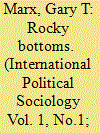| Srl | Item |
| 1 |
ID:
051904


|
|
|
|
|
| Publication |
May 2004.
|
| Summary/Abstract |
The hurricane of social change wrought by information technology can be viewed along with the development of permanent agricultural communities, urbanization, and industrialization as among the great transformations of civilization. It is also important, however, to ask how social and cultural factors affect the forms and processes of information technology, especially across cultures and time periods. We must avoid falling into the reductionist trap of technological determinism which involves a failure to appreciate the extent to which human choices have an effect on technical forms and impacts.
This paper contains a discussion of anonymity and information technology to illustrate some general conclusions about why the issues of information technology and society are so complicated and do not lend themselves to easy solutions, and why they support neither the rhetoric of technophiles who optimistically view information technology as the solution to societal problems, nor the technophobes who pessimistically view it as a source of societal problems.
|
|
|
|
|
|
|
|
|
|
|
|
|
|
|
|
| 2 |
ID:
077543


|
|
|
|
|
| Publication |
2007.
|
| Summary/Abstract |
This article uses a true fiction speech by Mr. Richard Rocky Bottoms to illustrate a number of background beliefs underlying contemporary perspectives on social control, borders and surveillance, and on technology more broadly. Rocky Bottoms exists only in the imagination, but the arguments he puts forth and the behavior he reflects are prevalent, and increasingly dominant, in the post-9/11 cultures of industrial nations. His speech is a composite of remarks, many of them direct quotes, that I have gathered as part of a research project on surveillance over several decades. The speech is critically analyzed in light of 38 techno-fallacies of the information age. The fallacies identified may involve empirical, logical, or value dimensions.
|
|
|
|
|
|
|
|
|
|
|
|
|
|
|
|
| 3 |
ID:
059121


|
|
|